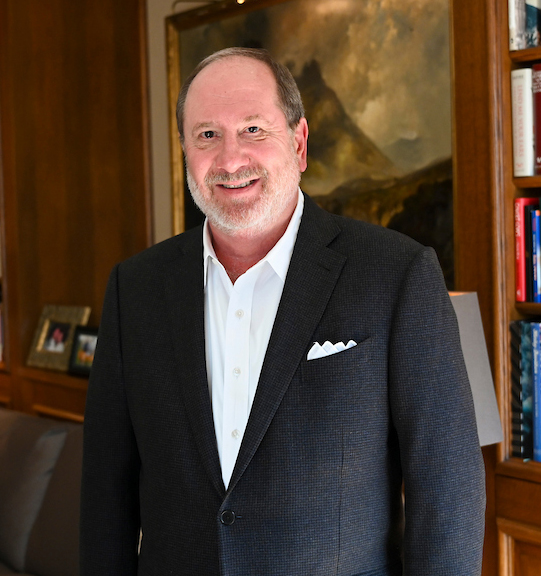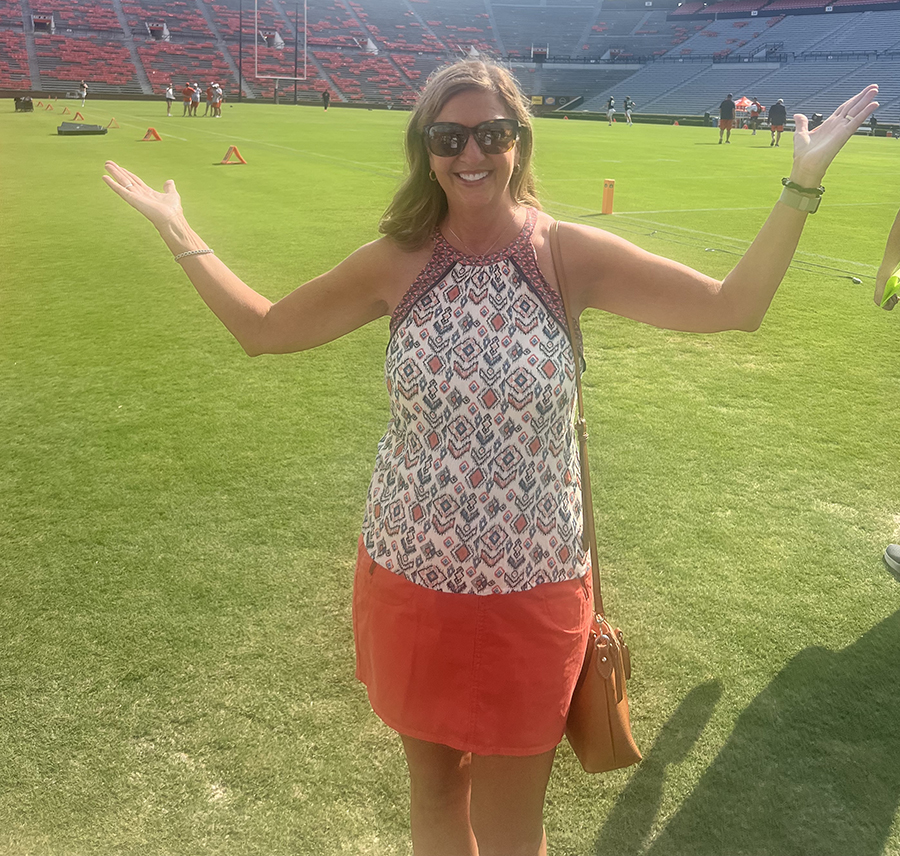
“Thanks to the experience I had with Auburn’s PEMBA program, I’ve become much more
comfortable with the technology required to work collaboratively from a distance." --
Dr. Ian Hamilton, Medical Director, Blue Cross and Blue Shield of Tennessee”
Editor’s Note: Auburn’s Harbert College of Business recently contacted members of our Physicians
Executive MBA (PEMBA) program to find out how health care delivery has changed during
the COVID-19 pandemic. In the following interview, three medical professionals discuss
how a business education meshes with the medical challenges.
The Experts
Dr. Addison May, PEMBA Class of 2018
Chief, Acute Care Surgery for Atrium Health – UNC Charlotte
Dr. May is chief of acute care surgery for a group of more than 40 hospitals and 900
care locations ranging from doctors’ offices to behavioral health centers to nursing
homes. He focuses on the care of critically ill and injured patients, and has extensive
experience in infectious diseases.
Dr. Robert Page, PEMBA Class of 2015
President of American Group, Envision Physician Services
Dr. Page manages a national network of doctors, nurses and other critical health care
professionals under contract by hospitals, urgent care units and other health care
delivery entities across the country. His position requires him to balance personnel
and critical PPE supply chains region by region and hospital by hospital, putting
him at the forefront of health care management issues in this pandemic.
Dr. Ian Hamilton, PEMBA Class of 2009
Medical Director, Blue Cross Blue Shield of Tennessee
Dr. Hamilton oversees the quality, safety and efficiency of critical services provided
to self-insured clients in Tennessee. His advanced skills in clinical practice, program
development, quality improvement, and staff leadership help create a highly focused,
systematic approach to COVID-19 care delivery.
HCOB: How has the COVID-19 pandemic changed your responsibilities on a day-to-day basis?
Dr. May: I'm responsible for ensuring that our region’s 12-hospital system provides the highest
level of care for critically ill and injured surgical patients. Acute care surgeons
are often referred to as the Swiss Army knife of surgeons in that we are trained in
both critical care and trauma care as well as general surgery, so it's a unique medical
profession.
Prior to the COVID-19 pandemic, my job primarily entailed balancing the workload of
surgeons and other medical personnel as needed across those 12 hospitals, taking into
account the day-to-day progress of critically ill patients, the inflow of injured
patients requiring immediate surgical procedures and scheduled elective surgery.
All that has changed dramatically in the past month. With the emergence of the COVID-19
pandemic, my job now entails putting into place the policies and procedures necessary
to ensure that we're able to provide care to our influx of critically ill COVID-19
patients while also maintaining our ability to provide vital services to other patients
with urgent and emergent surgical conditions or acute injury. One step in that process
was to postpone all elective surgery for those patients whose conditions are not immediately
life-threatening.
The new processes also including finding a way to expand our capacity to 140% of normal
while maintaining provider safety in caring for critically ill patients as well as
performing a wide range of high-risk surgical procedures. When I say “high-risk,”
it can mean high-risk for patients, but also high-risk for infecting our providers
given the shortage of personal protective equipment. I spend a lot of my time now
allocating surgical and other health care providers across our hospitals as needed,
while at the same time ensuring the procurement and distribution of PPE for all our
health care providers. All of this requires a greatly coordinated effort, particularly
in terms of communicating shifting priorities and new processes from the individual
ICU all the way up to the state level.
Dr. Page: I run the American group of Envision Physician Services, which covers Texas, Tennessee,
a little bit of Georgia, a little bit of Kentucky, Kansas and Missouri. We staff the
emergency departments of our client facilities and the predominance of all hospital
medicine, internal medicine, trauma surgery, some radiology and some anesthesiology.
In short, we supply the physicians and other health care providers at the hospitals
and other care facilities these clients operate and manage the quality of operations
for these programs.
My day-to-day responsibilities have changed markedly in the past few months. Before
COVID-19, I spent a good portion of my day in business development and growth, either
finding new practices to acquire, expanding our business in hospitals or selling in
new service lines to grow our business organically. Obviously, new business development
is not at the top of my list today. The vast majority of my time is now spent pulling
the levers on staffing—redeploying doctors and other healthcare providers across different
areas of the country.
For example, we have a lot of facilities up in the Northeast that are in dire need
of support. With patient volumes rising exponentially in those areas, putting the
right folks in the right locations to care for those patients is critical. At the
same time, there are a lot of smaller health care systems in our network that are
really struggling because they just don't have the manpower either. We've been able
to shift around the appropriate personnel to help those people out. That's really
been a large portion of my day—finding places for folks who have capacity and matching
that capability with facilities in immediate need.
And then there’s the critical issue of ensuring our doctors, nurses and other health
care providers have enough PPE. We've been fortunate in that respect because the Hospital
Corporation of America, our partner, has done a great job of helping us procure most
of what we need. But our smaller hospitals are not able to do that and don't have
that kind of bandwidth or the purchasing power. So, our company has stepped forward
and said, “We're going to protect our front-line providers by supplying them with
what they need.” We’ve purchased large amounts of PPE and have distributed those items
to the locations that are most in need so that our front-line providers can go to
work and feel safe. That's something we've never had to be concerned about before,
procuring equipment rapidly in a very competitive marketplace.
Dr. Hamilton: I work with large, self-insured clients who use us as the administrator for their
services, including their health benefits. Prior to COVID-19, we typically did the
vast majority of our work from our headquarters in Chattanooga, and I spent about
25 to 30 percent of my time on the road visiting large clients across the state of
Tennessee. Suffice to say that’s not happening anymore—no in-person meetings with
clients whatsoever. That’s a huge change. We all would prefer to meet in person where
you can socialize, connect on a personal level and take into account facial expressions
and body language.
But equally disruptive has been the remote working situation I and my team now face.
As is the case with client meetings, there’s a learning curve to meeting online with
your team vs. face-to-face. Try as you might, it just isn’t the same. But thanks to
the experience I had with Auburn’s PEMBA program, I’ve become much more comfortable
with the technology required to work collaboratively from a distance.
From a business perspective, one way my responsibilities have been affected is in
terms of the claims we are being charged with analyzing. For example, all elective
surgery has stopped, meaning there'll be a backlog when we get past all of this, when
we get back to a more “normal” schedule. At the same time, we are seeing a reduction
in claims resulting from accidents. People are driving less, they're not out drinking,
they're not wrecking their cars as often. They're not stabbing each other, falling
off hiking trails, getting trampled by horses and whatever other accidents people
typically encounter this time of year.
There’s simply not going to be as much human activity with everybody hunkered down.
That impacts how we assess our clients’ risk and model their exposure going forward.
Next in the series: Handling the business of medicine in a pandemic
Learn more about the PEMBA Program.


 Degrees & Programs
Degrees & Programs
 Faculty & Staff
Faculty & Staff
 Career Development
Career Development
 Recruiters & Industry
Recruiters & Industry







